Choosing between mediation and litigation depends on your goals and your relationship with your ex. Mediation fosters cooperation, open communication, and flexible agreements tailored to your family’s needs, often reducing stress. Litigation, however, can be costly, contentious, and more rigid due to legal standards. If you want more personalized and amicable solutions, mediation usually works best. To understand which path suits your situation and how it impacts your family, explore the details further.
Key Takeaways
- Mediation fosters cooperative decision-making, reducing conflict and emotional stress compared to adversarial litigation.
- Litigation offers legally binding decisions but can be lengthy, costly, and more adversarial.
- Mediation allows personalized custody and financial agreements tailored to family needs.
- Litigation often results in court-imposed rulings based on legal standards, with less flexibility.
- Choosing mediation promotes better long-term family dynamics and future co-parenting cooperation.

When facing divorce, you often have to decide between mediation and litigation, two distinct paths to resolving your disputes. Your choice will considerably impact how you settle issues like child custody and financial agreements. Mediation offers a more collaborative approach, encouraging open communication and mutual compromise. It allows you and your spouse to work together with a neutral mediator to reach agreements that suit both of you and, importantly, benefit your children. This process tends to be less adversarial, reducing emotional stress and fostering a cooperative environment for making decisions about custody arrangements. You can tailor custody plans that address your child’s needs more personally than a court might impose, giving you more control over the outcome. When it comes to financial agreements, mediation provides a space to discuss and negotiate terms that reflect your financial realities and future goals. You’re more likely to reach an agreement that is fair and sustainable because you’re actively involved in crafting it, rather than having a judge impose a ruling. Additionally, mediation can help preserve a more amicable relationship with your spouse, which is especially beneficial when co-parenting. Engaging in financial disclosure during mediation can further ensure transparency and fairness in the process. Recognizing the legal standards applied in court can help you prepare for how decisions are ultimately made and the possible implications for your family.
On the other hand, litigation involves taking your case to court, where a judge will decide on issues like child custody and financial agreements. This path can be more contentious, often resulting in a win-lose situation. If you and your spouse cannot agree, court proceedings may become prolonged and costly, with each side presenting evidence and arguments to sway the judge’s decision. Child custody disputes in court tend to be focused on what the judge believes is in the best interest of the child, which may not align perfectly with your desires. Financial agreements decided in court may be less flexible, with the judge basing decisions on legal standards and evidence presented during the trial. Litigation can also exacerbate tensions and make future cooperation more difficult, especially when it comes to co-parenting. Understanding how final court decrees work can help you prepare for the binding nature of court decisions and the potential long-term impacts on your family.
A clear understanding of the dispute resolution process can aid in making an informed decision about which path best suits your circumstances.
Frequently Asked Questions
How Do Mediation and Litigation Impact Children Involved in Divorce?
You might wonder how mediation or litigation affects your children’s child custody and emotional well-being. Mediation tends to foster cooperative decision-making, reducing stress and promoting a healthier environment for your kids. Litigation, however, can create conflict and uncertainty, potentially harming their emotional health. Your approach impacts their stability and happiness, so choosing a path that prioritizes open communication and minimizes conflict helps protect their best interests.
What Are the Costs Associated With Each Divorce Process?
You’ll find that mediation generally has lower financial implications and emotional expenses because it’s less formal and quicker. Litigation tends to be more costly due to attorney fees, court costs, and longer proceedings, which can also increase emotional stress. By understanding these costs, you can better prepare yourself financially and emotionally for your divorce process. Choosing the right path depends on your circumstances, but knowing the costs helps you make an informed decision.
Can Mediation Resolve Complex Property and Debt Issues?
Can mediation masterfully manage complex property division and debt resolution? Absolutely. You can collaboratively clarify and compromise on property issues, ensuring fair division. Mediation encourages open dialogue, helping you untangle tangled debts with tact and transparency. While some situations are straightforward, others require skilled mediators to navigate intricate financial webs. With patience and professionalism, mediation can effectively resolve even the most complicated property and debt disputes, fostering a fair and amicable agreement.
How Long Does Each Divorce Process Typically Take?
The divorce timeline varies based on factors like complexity and cooperation. Mediation generally takes a few months, as it’s a quicker, more flexible process. Litigation can extend from several months to over a year, especially if there are contested issues. Your process duration depends on how smoothly negotiations go, but with mediation, you often reach a resolution faster, while litigation tends to be lengthier and more formal.
What Are the Risks of Choosing Litigation Over Mediation?
Choosing litigation can lead to more court conflicts and emotional strain, which might complicate your divorce process. You face the risk of prolonged disputes, increased legal costs, and unpredictable outcomes. The adversarial nature often intensifies stress and damages relationships, making cooperation harder. While litigation can be necessary in some cases, it’s vital to reflect on these potential pitfalls and weigh them against the benefits of more peaceful resolution methods.
Conclusion
Choosing between mediation and litigation depends on your unique needs, but mediation often offers a more collaborative, cost-effective approach. Did you know that couples who mediate their divorce save an average of $7,000 compared to those who go to court? By prioritizing open communication and mutual agreement, you can reduce stress and reach a resolution that works for both of you. Ultimately, weighing your priorities will help you pick the best path forward for your future.










